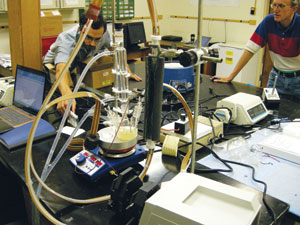Recycled catalyst process developed

September 20, 2010
BY Luke Geiver
Current biodiesel production methods involve catalysts made of concentrated sulfuric acids and caustic methoxides, which "creates a whole host of problems," according to Tyson Johnson, CFO of Georgia-based biodiesel research facility, Down to Earth Energy. Johnson and his research team from the University of Georgia may have found the answer, and it starts with catalyst recycling. "We've taken effective catalytic functional groups and immobilized them on a solid substrate," Johnson said. The functional catalyst groups created by Down to Earth look and feel a lot like charcoal, Johnson said, and when the catalysts remain in a fixed column, the process allows for additional catalyst use in future reactions.
Made from readily available, natural woody biomass, the catalyst process drastically cuts down on the waste effluents from conventional production methods, according to Johnson, "because the process does not require the addition of acids and caustics." The recycling method subsequently produces a glycerin product largely free of soaps, salts and will be pH neutral. "The lack of those impurities will make separations much easier and reduce the amount of biodiesel that gets carried over with the glycerin."
The catalyst also acts as an adsorbent, and this allows some front-end impurities to adsorb on the catalyst surface. But, Johnson said, this creates a trade-off. "The dirtier the oil going in, the shorter the life of the catalyst, and the shorter the amount of time before regeneration is necessary," so Johnson added, producers will want to stick with their current filtering and dewatering setups.
While Johnson's goal is to give every biodiesel producer, regardless of size, an affordable solid catalyst that can be easily integrated into both batch or continuous processes, those interested in the recyclable catalyst method will have to wait. With the technology still in the development stages, the team is struggling to find the time necessary for research and development, while playing "the grant-seeking game which requires long hours and no guarantees," according to Johnson. The work is currently being funded by U.S. EPA, along with supplements from the Georgia Research Alliance. "We have not yet begun seeking out private money and probably won't begin to do so until we have rounded out performance and data," Johnson said.
Along with process development and testing, the Down to Earth team is also working to form relationships that will get the catalysts to market, and some early ones have already paid off. Jim Kastner from UGA's Agriculture Engineering Department and Dan Geller from the UGA's Engineering Outreach program have already been instrumental in development of the project. "The initial idea for the project came from Jim and Dan, both of whom have been working with biochar and pyrolysis technologies for some time now," Johnson said. Plans for commercialization, including pilot testing and market implementation, are currently scheduled for summer 2011 and will most likely stretch into 2012. In the meantime, Johnson and his team, which also includes Down to Earth chemist Larry Keith and others, are "focused on giving this technology in its current form the best chance," and although the future goal of the project may sound like an idea that's been used before, Johnson said the project so far has been a success.
Made from readily available, natural woody biomass, the catalyst process drastically cuts down on the waste effluents from conventional production methods, according to Johnson, "because the process does not require the addition of acids and caustics." The recycling method subsequently produces a glycerin product largely free of soaps, salts and will be pH neutral. "The lack of those impurities will make separations much easier and reduce the amount of biodiesel that gets carried over with the glycerin."
The catalyst also acts as an adsorbent, and this allows some front-end impurities to adsorb on the catalyst surface. But, Johnson said, this creates a trade-off. "The dirtier the oil going in, the shorter the life of the catalyst, and the shorter the amount of time before regeneration is necessary," so Johnson added, producers will want to stick with their current filtering and dewatering setups.
While Johnson's goal is to give every biodiesel producer, regardless of size, an affordable solid catalyst that can be easily integrated into both batch or continuous processes, those interested in the recyclable catalyst method will have to wait. With the technology still in the development stages, the team is struggling to find the time necessary for research and development, while playing "the grant-seeking game which requires long hours and no guarantees," according to Johnson. The work is currently being funded by U.S. EPA, along with supplements from the Georgia Research Alliance. "We have not yet begun seeking out private money and probably won't begin to do so until we have rounded out performance and data," Johnson said.
Along with process development and testing, the Down to Earth team is also working to form relationships that will get the catalysts to market, and some early ones have already paid off. Jim Kastner from UGA's Agriculture Engineering Department and Dan Geller from the UGA's Engineering Outreach program have already been instrumental in development of the project. "The initial idea for the project came from Jim and Dan, both of whom have been working with biochar and pyrolysis technologies for some time now," Johnson said. Plans for commercialization, including pilot testing and market implementation, are currently scheduled for summer 2011 and will most likely stretch into 2012. In the meantime, Johnson and his team, which also includes Down to Earth chemist Larry Keith and others, are "focused on giving this technology in its current form the best chance," and although the future goal of the project may sound like an idea that's been used before, Johnson said the project so far has been a success.
Advertisement
Advertisement
Upcoming Events





